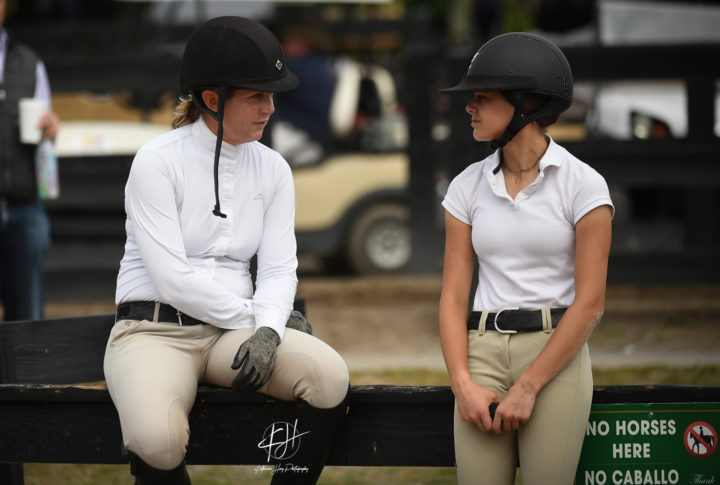For more than a century, riding has been part of daily life at Walker’s.
Our program is pedagogically-based where girls are taught to ride — not train — where the riding facilities are viewed as outdoor classrooms, where emphasis is placed on horsewomanship, and where mission-driven social and emotional learning is nurtured.
Our nationally-recognized trainers, Linda Langmeier, Ken Whelihan, and Randi Booth, have the expertise to coach riders at all level and they work with students to attain any set of goals our students strive to achieve. They are lifelong horsewomen who share a passion for the sport and a love of teaching. Each has earned national titles for themselves or by working with students in hunter, jumper, and equitation, bringing starting riders up through the levels or advancing seasoned riders to regional and national levels. The trainers also teach our weekly Ground School where students learn how to become fully-versed in horsewomanship.
On the competitive side, at the core of the program is an exceptional interscholastic team and a sought-after program for the A-level competitor. Trainers work with students to set riding goals and map out a plan to achieve them, whether the goals are competitive or a student simply wants to develop your skills. The trainers check in seasonally with all riders, whether beginner or advanced, to reassess their progress and review their goals.
Our Core Program
Walker’s equestrian program offers two lesson packages that cater to the individual needs of our students. Every student will participate in weekly Ground School which focuses on helping girls become complete horsewomen while also learning about equine care. Students are encouraged to do a free ride (hack) on the days they are not lessoning. At the beginning of each season, Walker’s equestrian trainers conduct evaluation rides for all incoming students. Evaluation rides are not team tryouts but rather an opportunity for the trainers to assess the needs and experience level of each new student and horse.
Walker’s Equestrian Team travels to a variety of shows recognized by local, regional, national, and international equestrian associations. The School hosts fall and spring USEF-rated competitions. Walker’s team members both compete and help at their home shows. Upon their return to school in the fall, competitors participate in the Dover Saddlery USEF Medal Finals, the ASPCA Maclay Finals, and Platinum Performance USEF Talent Search Finals as well as the New England Equitation Finals.
In the winter, Walker’s equestrians head south to participate in the Winter Equestrian Festival in Wellington, Florida. This gives the riders the opportunity to ride and compete with the finest riders in the country. After Wellington, The Devon Horse Show, Saratoga and local competitions fill up the calendar. Riders can continue to compete throughout the summer at Lake Placid, Vermont, and the Hamptons along with local shows.
The Ethel Walker School participates in the Interscholastic Equestrian Association (IEA), a national organization created to introduce students in private and public middle and secondary schools to the equestrian sport. The IEA program is offered as an optional addition to Walker’s Riding team program. Walker’s hosts two IEA horse shows per year and riders compete in additional IEA horse shows within our region. Entries for IEA horse shows are only open to riders who are members of the IEA riding program. Learn more about IEA by visiting IEA Fast Facts.
Introduced to Walker’s science curriculum in 2008, Equine Science is taught by licensed veterinarian Dr. Suzanne Piela as a year-long science elective. This intense equine biology class encompasses the anatomy and physiology of all the systems of the horse, nutrition, toxicology, parasitology, health management, neonatology, epidemiology, and sports medicine. While the curriculum is of special interest to Walker’s riders, it is also beneficial to students interested in veterinary science, or careers in medicine and biology. The course features guest speakers, current events, journal articles, field trips, case studies, and weekly labs. Walker’s barn lends itself as a natural classroom, and allows students to gain hands-on experience and apply what they have learned in class to real life experiences. Students gain a strong foundation in most of the systems in the equine body, and use this knowledge to work up different cases during the second semester. Students also learn how to ask the right questions to obtain a medical history, interpret physical exam and diagnostic test findings, and recognize signs of injury and disease in their own horses.
